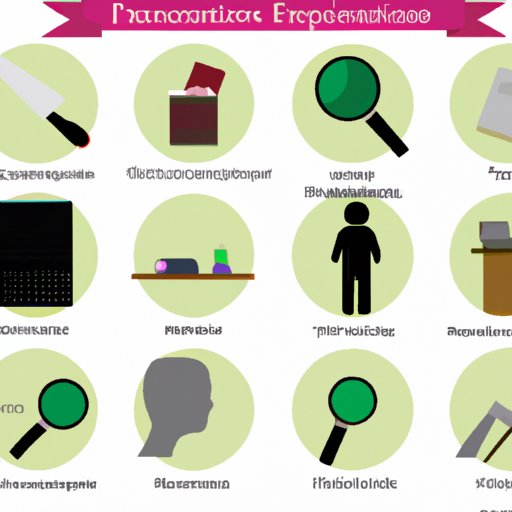
I. Introduction
Forensic science is a fascinating and critical field that plays a vital role in the justice system. From fingerprint analysis to DNA testing, forensic evidence can help solve crimes, exonerate the innocent, and bring closure to victims’ families.
If you’re interested in pursuing a career in forensic science, you’re in the right place. In this comprehensive guide, we’ll break down everything you need to know to become a forensic scientist, including education, training, and necessary skills, choosing the right degree path, working environment, techniques, and tools used in forensic science, and exciting opportunities and challenges that lie ahead.
II. Breaking Down the Key Steps to Becoming a Forensic Scientist
The path to becoming a forensic scientist typically involves completing a bachelor’s degree in a related field, such as biology, chemistry, or forensic science. You’ll then need to gain practical experience through internships, training, or entry-level positions.
Most employers require a master’s or doctorate degree in forensic science or a related field, as well as certification in a specific area of forensic science, such as DNA analysis or ballistics.
To become a successful forensic scientist, you’ll need to possess excellent analytical skills, attention to detail, problem-solving skills, and the ability to work well under pressure.
III. From Biology to Ballistics: Choosing the Right Degree Path to Become a Forensic Scientist
There are several degree paths you can take to become a forensic scientist. The most common are degrees in biology, chemistry, and forensic science.
Biology: A degree in biology is an excellent foundation for a career in forensic science, as it provides in-depth knowledge of living organisms and their functions. Courses typically cover anatomy, genetics, biochemistry, and microbiology.
Chemistry: A degree in chemistry is also beneficial for a career in forensic science, as it concentrates on chemical reactions and properties of matter. Courses typically cover organic chemistry, analytic chemistry, and physical chemistry.
Forensic Science: A degree in forensic science is specifically tailored to prepare students for a career in the field of forensic science. It covers topics such as laboratory analysis, forensic accounting, forensic toxicology, and forensic pathology.
Choosing the right degree path is crucial for your future in forensic science. Consider your strengths and interests, as well as the skills you want to develop while pursuing your education.
IV. Behind the Scenes of the Forensic Science Lab: What You Need to Know Before Pursuing a Career
A forensic scientist works in a laboratory environment, analyzing evidence collected from crime scenes and assisting law enforcement in their investigations. Attention to detail is essential, as even the smallest detail can help solve a case.
Working in a forensic science lab is not for everyone, as it requires a high level of concentration, patience, and organization. Additionally, you’ll need to keep up with the latest developments in forensic science, attend conferences and workshops, and continually update your knowledge.
Day-to-day responsibilities include analyzing evidence, preparing reports, testifying in court, and managing a large workload of cases. You’ll also work closely with law enforcement personnel and other experts in the field.
V. Revealing the Mysteries of Forensic Science: A Comprehensive Guide to Getting Started
Forensic science covers many areas, including DNA analysis, ballistics, toxicology, forensic accounting, and pathology. Techniques such as fingerprint analysis, blood spatter analysis, and fiber analysis are also used to investigate and analyze evidence.
The tools and equipment used in forensic science vary depending on the area of specialization. However, some common tools include microscopes, cameras, spectroscopes, and chromatographs.
While forensic science is fascinating and exciting, it can also be challenging, requiring extensive attention to detail and a keen eye for detail. However, for those with a passion for this field, it can be one of the most rewarding careers available.
VI. The Journey to Becoming a Forensic Scientist: Realities, Challenges, and Exciting Opportunities Ahead
Working as a forensic scientist requires a great deal of dedication and hard work, but it also offers numerous rewarding opportunities. It can be a great way to contribute to society, help solve crimes, and bring closure to victims’ families.
However, forensic science is also a challenging field. It requires extensive knowledge and skills, attention to detail, and a willingness to work long hours and handle potentially disturbing material.
As a forensic scientist, you’ll face many challenging situations, from analyzing complex evidence to testifying in court. However, you’ll also have the opportunity to be part of a team that makes a significant difference in the world.
VII. Next-Level Investigation: How You Can Join the Elite Circle of Forensic Scientists
If you’re interested in taking your career in forensic science to the next level, you may want to consider specializing in a specific area. Some areas of specialization in forensic science include DNA analysis, ballistics, pathology, and forensic accounting.
Specializing in a particular area requires advanced training and education, certification, and extensive experience. However, it can also lead to exciting opportunities and a fulfilling career.
VIII. 5 Essential Tips to Jumpstarting Your Career in Forensic Science Today
If you’re interested in pursuing a career in forensic science, here are five essential tips to help you get started:
- Take relevant courses in biology, chemistry, or forensic science.
- Seek out internships or entry-level positions to gain practical experience.
- Obtain a master’s or doctorate degree in forensic science or a related field.
- Develop excellent analytical, problem-solving, and communication skills.
- Stay up-to-date with the latest advances in forensic science.
IX. Conclusion
Forensic science is a critical field of study that offers exciting opportunities for those with a passion for justice and investigation. With the right education, training, and experience, you can be part of a team that makes a significant difference in the world.
Remember to choose the right degree path, research the working environment, and develop the necessary skills to succeed in this challenging but rewarding field. By following these essential tips, you can jumpstart your career in forensic science today.




